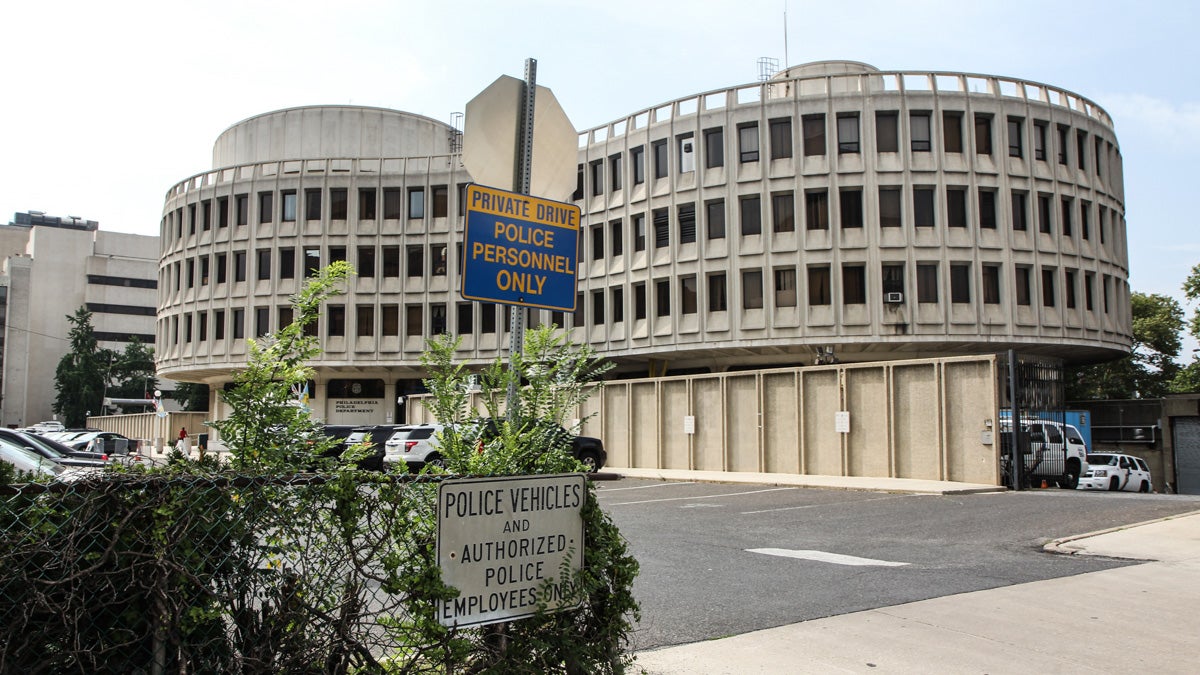Shining the light on police corruption in Philadelphia through transparency

Philadelphia Police Department headquarters at 7th and Race streets (Kimberly Paynter/WHYY)
When it comes to the pervasiveness of police corruption, the brass like to blame “a few bad apples,” saying most officers do their jobs justly while a small handful dishonor their badge.
But that theory is tough to prove, given that the Philadelphia police department, like most of the nearly 18,000 law enforcement agencies nationally, guard disciplinary records and trends as if they were state secrets, watchdogs agree.
That’s why The Declaration, a local alternative news website that advocates for accountability and openness, launched The Philadelphia Police Accountability Project last month. The project is an independent, publicly accessible database of civilian complaints against police; anyone can read for themselves a complaint’s narrative, investigative summary and outcome.
“Really we see this as a tool to inform the public and to empower the public … to get the reforms that are so desperately needed in this city,” said Dustin Slaughter, The Declaration’s cofounder. “We want to not just crunch numbers and stats. We’ll provide the raw documentation that contains the narrative of people who have filed complaints against the police, and those documents will also reveal how those cases turned out and how the police department investigated itself. (Citizens can then learn) who the problem officers are. That hopefully will give the public leverage against elected officials and the police department to push for systemic change.”
Some context: Former Police Commissioner Charles Ramsey, during his eight-year tenure as Philly’s top cop, became known for his commitment to fighting corruption, rooting out repeat offenders within the ranks, and making policing more transparent. To that end, he launched a body-camera program, led an effort to post more information online, and changed police policy to publicly identify officers who shoot people.
But many such measures met pushback by critics worried the reforms would endanger officer safety and impinge on privacy rights.
As for complaints against police (known as CAPs), the department already is supposed to be publishing them, at least in aggregate. Under a 2011 executive order, then-Mayor Michael Nutter directed the department to “publish statistics semi-annually disclosing the number of complaints filed, the nature of the complaints, and their disposition.”
But that information isn’t on its website, nor released publicly as a report.
Police spokesman Lt. John Stanford said the department complies with the 2011 order by releasing CAPs to whoever asks the internal affairs unit for them. “Reports compiled of CAPs statistics, the nature of the complaints and their disposition are produced, published and issued to the commissioner and anyone else interested in receiving it,” said Stanford, who did not respond to WHYY’s request for the reports.
CAPs requests can take weeks and cost big bucks, considering a single complaint can run a dozen pages or more. An internal affairs supervisor reviews each complaint before releasing it, and the department charges 25 cents a page for copies.
That’s why Slaughter’s database contains just 45 complaints so far — and why he’s trying to raise $5,000 through grants and donations to fund the project. He estimates that’ll be enough to pay for five years worth of complaints.
Slaughter and other police reformers feel like the department doesn’t comply with Nutter’s order.
“Stanford’s position is without question a very conservative reading of the EO, at best, and disingenuous, at worst,” Slaughter said.
Kelvyn Anderson, who heads the civilian Police Advisory Board, agreed: “I would not describe (getting CAPs) as being exactly user-friendly, and I simply don’t agree that what has been ‘published’ by the department on complaints is adequate. I have not seen a single report to come out of the department that systematically shows complaint data in aggregate form. In general, I would say that, as an agency that is deeply concerned with availability of information that comes out of the police department, we would applaud any organization that seeks to point out information that already should be in public view.”
Other cities, including Chicago, do release citizen complaint data.
Mayoral spokesman Mike Dunn said city officials will look into the issue.
“The Kenney administration policy on CAPs data is identical to the previous administration’s policy on CAPs data,” Dunn said. “While we believe we’re in compliance with the spirit of the EO, we’re happy to review the issue and make adjustments if appropriate. The department and the administration is committed to transparency on these issues and to an open dialogue with advocates.”
John McNesby, who heads the Fraternal Order of Police Lodge 5, declined to comment.
Transparency, one watchdog said, is something everyone involved in policing should want.
“Instead of having conversations fueled by suspicion, conjecture and innuendo, we can have a more honest and open conversation, based on facts, about what actually occurs,” Anderson said.
Sara Darehshori, senior counsel in the US program of Human Rights Watch, agreed: “Transparency creates pressure for police to respond to genuine complaints. Important police corrections and reforms have come about because of increased transparency.”
WHYY is your source for fact-based, in-depth journalism and information. As a nonprofit organization, we rely on financial support from readers like you. Please give today.




